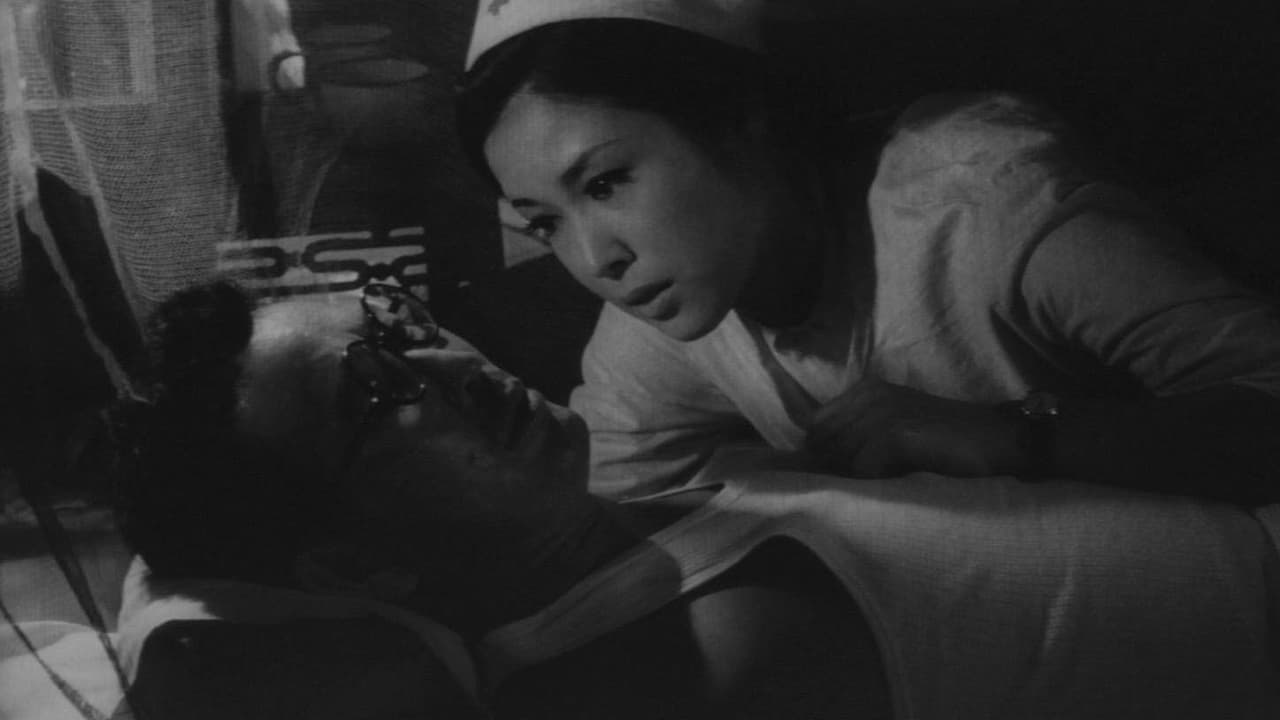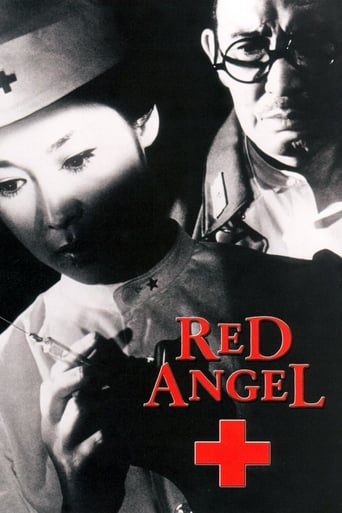

Red Angel (1966) directed by Yasuzo Masumura is just another impressive film that makes me wonder why he isn't better known outside of Japan. This is yet another powerful, subversive film that embodies what the New Wave was all about-shaking up the status quo. It was written by Ryozo Kasahara and based on a novel by Yoriyoshi Arima, Red Angel has to be counted among the great Japanese war movies of all-time. This is no simple humanistic take on WWII, within the first twenty minutes there is a rape and a graphic amputation of a leg-complete with bone chilling sawing sounds on the score. This film is not for the squeamish. Ayaka Wakao, who seems to be Masumura's muse, plays Sakura Nishi, who is sent to the Manchurian front where she learns the brutal realities of the war first hand through the rape and many amputations and bullets removed from soldiers who seem to have a 50-50 chance of survival in such conditions. She is well-meaning and a bit sensitive and feels that her complaints about the soldier who raped her got him sent back to the front early, which in this film means certain death. Later she tries to comfort a double arm amputee, who feels that he won't have that sort of comfort again, so kills himself by jumping off a roof. At another station near the front there is an outbreak of cholera among the comfort women, imagine admitting that comfort women existed! But of course they seems to be Japanese "volunteers" (but it is still hard to image them appearing in a film made today). She eventually falls in love with a well-meaning doctor, Dr. Okabe (Shinsuke Ashida), who is numbing the reality with drink and morphine. The morphine has made him impotent, but Nishi helps wean him off it so that they can a last fling before they are overrun by the Chinese army. During this sequence a young nurse Nishi has brought along, in order to protect and look after, is killed before her eyes. Nishi emerges as the lone survivor finding her lover dead on the battlefield. It is a bleak and somewhat exploitative war film that is astonishing in the fact that the studio signed off on such a dark and truthful film about the war.
... View MoreAn estimated twenty million Chinese and two million Japanese soldiers were killed in the second Sino-Japanese War that lasted from 1937-1945. If anyone thought for one moment that there was a glorious aspect to this war or any other, Yasuzo Masamura's Red Angel will dispel that forever. Written by Ryozo Kasahara and based on a novel by Yoriyoshi Arima, Red Angel is a powerful anti-war drama in which scenes of rape, dismemberment, drug withdrawal, disease, and suicide are graphically shown by Masamura, who spares nothing except the erotic details of lovemaking. Set in Manchuria in the early days of the conflict, the "red angel" in the film is Nurse Sakura Nishi played by Masamura regular Ayako Wakao.Nurse Nishi is stationed on the battlefield as a care giver but most patients, racked by loneliness and fear of impending death, see her as a sexually available woman. On her first night while making the rounds, Nishi is gang raped and held down by the group while she is sexually assaulted by Pvt. Sakamoto (Jotaro Senba). After reporting the incident to the head nurse, Nishi learns sadly that this is something she should have expected. Transferred to the front, Nishi is stationed at an army field hospital where she assists Dr. Okabe (Shinsuke Ashida), the only available surgeon in performing amputations.With few drugs and not enough blood available for transfusions, Okabe is forced to amputate arms and legs in hopes of saving the young men but is torn by feelings of guilt and remorse. He believes that most of the amputees would be better off dead since he knows that the Army will not let them go home because they would symbolize the idea that Japan is losing the war. Nishi pleads with Okabe to give a blood transfusion to Sakamoto, the man who had raped her during her first assignment and Okabe agrees but on the condition that Nishi comes to visit him at night. Discovering that Okabe is a man of compassion, Nishi sympathizes with his plight and begins to fall in love with him, though it cannot be expressed because the doctor is a morphine addict and is impotent.In one of the most heart-wrenching sequences, Nurse Nishi takes pity on Pvt. Orihara (Yusuke Kawazu) who has lost both of his arms. After pleading with the young nurse to relieve him of his sexual frustration, she takes him to a hotel where he expresses his pent-up passion but the evening proves too much for him to handle. In the final and most moving segment, a cholera attack has decimated the remaining soldiers who are surrounded by Chinese troops and as death becomes closer, Nishi and Okabe vow to make every effort to preserve their humanity even through Nishi's attempt to end Okabe's morphine addiction.Although there is romance in Red Angel, Masamura makes it quite evident that a normal relationship is impossible under conditions of war. His vision of war is one of hell where there is no honor or glory, only physical and emotional degradation and killing in the name of patriotism. Although Red Angel is lurid and has moments of melodrama, it is a brutally honest film that shows war without sentimentality, perhaps a reason for it remaining unreleased until Fantoma Films resurrected it on a widescreen DVD in 2006.
... View MoreThis is the story of Nurse Sakura Nishi, who is a young army nurse sent to field hospitals in China during the Sino-Japanese war. There she sees the atrocities of war, sometimes by her own people. She has a conscience (after being raped, she reports it and that soldier Sakamoto goes back to the front. Not much later, he is wounded and she tries to save his life. It is a great scene). There are amputations at will in these makeshift hospitals at the request of Dr. Okabe, whom Nurse Nishi falls in love with. That is perfectly believable, this is a time of war. Ayako Wakao, who is a great actress, plays Nurse Nishi perfectly. Her expressions at seeing all this brutality, her reactions to it are all true to life. You can only wonder what it was like to be there, she shows you. Not for the faint of heart of course, this film is grim but very gripping. Shot in glorious black and white, it depicts the horrors of war with a little light (Nurse Nishi) for all who have experienced it. Brutal but essential.
... View MoreExtremely tough little b/w gem from director, Masumura. It's 1939 and the Japanese are fighting in China, to not very much effect. We follow the efforts of those in field hospitals desperately trying to pick up the pieces when each load of war injured is raced back from the front line. Limbs are sawn off and bullets removed, all without aesthetic but plenty of blood and screams. Amid it all our heroine struggles to recover from her early rape by patients and the requests of the desperate and dying. This movie is so well put together that it is only afterwards you wonder just how that scene where she allows the handless man to feel her with his feet or make her senior a 'man again', without it seeming incongruous within this tale of death and destruction. With the blatant misogynism, nudity, explicit surgery, bondage, drug taking and even cross dressing, not to mention the inherent criticism of the Japanese stance, it is a wonder this film got made, distributed and survived. Important and enthralling film.
... View More